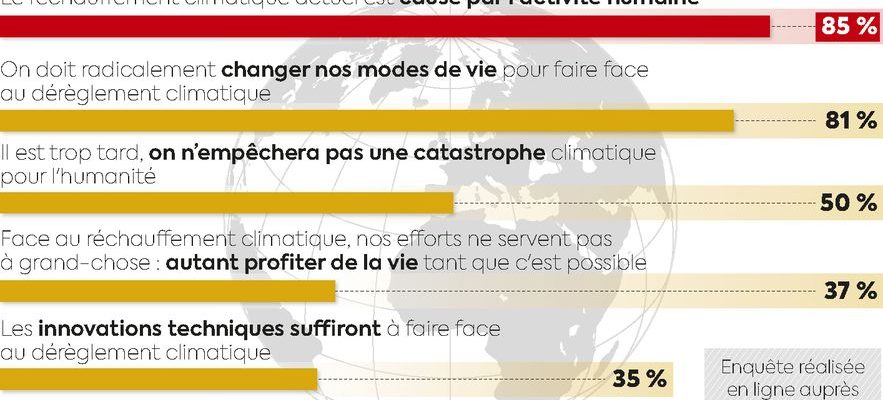The work of undermining climatosceptics on social networks does not change anything. The French have, on the whole, a fairly accurate vision of what awaits us in 2050. Asked about the rising waters in certain seaside resorts, the number of fires to come or even the future drop in agricultural yields, 60% of them already have the right orders of magnitude in mind, according to a survey conducted by Act For Now for Axa Climate. Thus, the question is no longer whether climate change is the result of human activities: 85% of French people support this idea. They are also 81% to think that a radical change in our lifestyles is necessary to deal with the current disruption. “A collective intelligence is emerging”, notes Antoine Denoix, the boss of Axa Climate.
But, at the same time, a new divide is emerging, with on the one hand the pessimists – 33% of the sample – who anticipate worse consequences than those of the simulations carried out by the scientists, and on the other the optimists – a another third of respondents – who think that technical innovations will be enough to deal with climate change. “The risk is that an increase in overly catastrophic or insufficiently scientific discourse reinforces this divide”, analyzes Antoine Denoix.
Eco-anxiety, an alarming phenomenon
Especially since the link between technology and climate is complex. Today, many countries are turning to solutions for capturing and burying CO2, with the risk of not accelerating sufficiently on the reduction of greenhouse gas emissions, which must remain the main objective according to the scientists. At the same time, some countries want to explore more controversial avenues: using particles sent into the clouds or the atmosphere, they seek to promote rain or reflect some of the solar radiation back into space.
Impossible to control, these options are already giving cold sweats to part of the population. And this is also the other major lesson of the Axa Climate study: we should probably expect a spectacular rise in eco-anxiety in the months and years to come. The figures compiled by Act For Now are already eloquent: due to climate change, half of those questioned experience daily fear, 47% anger, 30% depression and 21% sleep disorders, as well as loss of motivation at work! “This condition must be taken seriously, because it could well lead to a real public health problem”, warns Pierre-Eric Sutter, occupational psychologist and co-author of the book. Living well with your eco-anxiety (Gereso, 2023). In an attempt to assess the extent of the problem in France, this specialist last year studied a sample of 3,500 people using a method and a clinical picture developed by a team of Anglo scientists. -Saxons. The result ? “We realized that there were 5% of the adult French population, therefore potentially 2.5 million individuals, very highly eco-anxious, to the point of having to meet a psychologist because their mental health is threatened. It was like a bomb to us,” says Pierre-Eric Sutter.
3757 climate infographic French Divided
© / Art Press
Invest individually in an ecological project
Still not very sensitive to the subject, companies will have to look into the problem, even if there are few solutions. Difficult, indeed, to envisage a rapid cure for the people frightened by the reheating, since the reduction of the CO2 emissions advances slowly and that it will not produce its full effects before a long time because of the inertia of the climate. “Failing to treat the cause of the problem, we can act on the symptoms by finding, for example, an ecological project in which patients can get involved, notes the expert. However, 2.5 million people, it is gigantic compared to the 78,000 psychologists working in France, especially since the Covid has also wreaked havoc on the mental health of the population”. The risk, in the long term, is to leave some of the anxious French on the side of the road.
